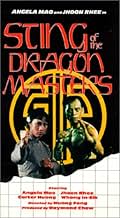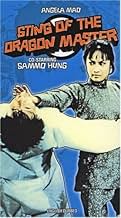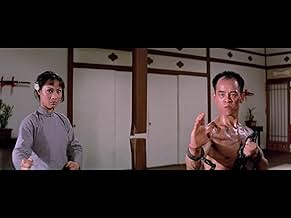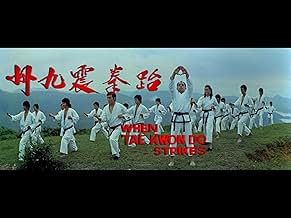Agrega una trama en tu idiomaDuring the Japanese occupation of Korea, the leader of a resistance movement, who's also a Taekwondo master, and his apprentices struggle against the brutal Japanese occupiers, aided by a Ch... Leer todoDuring the Japanese occupation of Korea, the leader of a resistance movement, who's also a Taekwondo master, and his apprentices struggle against the brutal Japanese occupiers, aided by a Chinese female martial artist.During the Japanese occupation of Korea, the leader of a resistance movement, who's also a Taekwondo master, and his apprentices struggle against the brutal Japanese occupiers, aided by a Chinese female martial artist.
- Dirección
- Guionista
- Elenco
Carter Wong
- Jin Zheng Zhi
- (as Carter Huang)
- Dirección
- Guionista
- Todo el elenco y el equipo
- Producción, taquilla y más en IMDbPro
Opiniones destacadas
The DVD version released by Crash Cinema was very poorly done. The mastering engineer must have been either drunk, asleep or not even in the room while it was being done. It looks like it was mastered from about a tenth generation copy and about halfway through the film, the audio synchronization disappears. The dialog is about 10 or 15 seconds behind the audio. If you're thinking about purchasing this DVD, please save your money. I remember seeing this film at the theater back in 1973. Also, the VHS copy of this film under the title of "When Taekwondo Strikes" looks better than the DVD, but the remaining several minutes of the movie are "missing". Where is the original camera negative?
Set in Korea, the film follows a small band of rebels who are engaged in fighting with occupying Japanese forces. Rhee stars as the leader of the resistance and, together with Chinese Hapkido expert Wan Ling-Ching (Mao), must ensure the safety of his group by seeking the help of their Chinese allies.
Angelo Mao whups some behind once again when helping a resistance leader and consequently running into some Japanese, who are the villains here, and they're painted as nasty individuals. It's a solid picture, has a strong story and some good emotions conveyed by Mao and Rhees. But it's the dazzling display of gritty "school of hard knock" action that beholds you. If you liked Hapkido, this would be up your street.
Angelo Mao whups some behind once again when helping a resistance leader and consequently running into some Japanese, who are the villains here, and they're painted as nasty individuals. It's a solid picture, has a strong story and some good emotions conveyed by Mao and Rhees. But it's the dazzling display of gritty "school of hard knock" action that beholds you. If you liked Hapkido, this would be up your street.
This movie made after the 1972 classic Hapkido also starring Angela Mao, is almost like a sequel or part 2 of that movie. The premise is almost identical in that in Japanese occupied Korea, Japanese martial arts school causes trouble with the missionaries, and also the locals. Taekwondo experts stand up to fight the tyranny of the Japanese.
Angela Mao and Sammo Hung also stars in this classic as well as real life Tae Kwon Do master Jhoon Rhee.
When I first saw these movies, I felt that they were cheezy after seeing the Enter the Dragon which were made on a budget that was about 50X that these movies are made on. But when I look at it now, I can see how well these movies were made. On little resources, and and made on short shooting schedule, these actors did amazing feats with their action.
Angela Mao always had incredible screen presence with her school girlish good looks. She still looks amazing today at her age of 62. She almost looks the same as when she made this movie. Compared to Hollywood stars who age very rapidly, I always wonder what these Asian actors do to keep their youthful appearances.
If you want to see power packed kung fu action from the '70s, this movie won't disappoint. It's a beautiful movie that's aged well with time, and would satisfy any kung fu action fans.
Angela Mao and Sammo Hung also stars in this classic as well as real life Tae Kwon Do master Jhoon Rhee.
When I first saw these movies, I felt that they were cheezy after seeing the Enter the Dragon which were made on a budget that was about 50X that these movies are made on. But when I look at it now, I can see how well these movies were made. On little resources, and and made on short shooting schedule, these actors did amazing feats with their action.
Angela Mao always had incredible screen presence with her school girlish good looks. She still looks amazing today at her age of 62. She almost looks the same as when she made this movie. Compared to Hollywood stars who age very rapidly, I always wonder what these Asian actors do to keep their youthful appearances.
If you want to see power packed kung fu action from the '70s, this movie won't disappoint. It's a beautiful movie that's aged well with time, and would satisfy any kung fu action fans.
Jhoon Rhee should have made more martial arts films as he is one of the top practioneers of his style, Tae Kwon Do. He was one of a few people who taught Bruce Lee high kicks.
Even so, this Asian movie from 1973 is a solid one. Most of the time in an Asian production, the fight sequences are speeded up and ridiculously so. "When Tae Kwon Do Strikes" is a bit different, as the choreography is executed in real time. In my opinion, this doesn't detract from the film's entertainment.
I have been watching martial arts films for about 30 years but I hadn't heard of the above film until 2 years ago. It was worth the wait though.
While the film is not abundant with taekwondo philosophy or technique, it does tell a story that most American taekwondo students are unfamiliar with. That story is set in the backdrop of the Japanese occupation of Korea during World War II and the Korean resistance to that occupation. This tale of modern oppression is, simultaneously, a tale of how embedded in the fabric of the Korean culture taekwondo is. Rhee plays the leader of the underground resistance who is, of course, a taekwondo Grandmaster. Rhee is forced to reveal his identity, and risk death, in order to attempt to save the life of an imprisoned Catholic Priest.
The film's sparse dialogue is subtitled but the action is plentiful as Rhee is joined by an All Star cast of Asian action stars, including Angela Mao, Carter Wong, Sammo Hung, and many more fighters/actors. While many styles of martial arts are evident, the presence of Rhee and Anne Winton, Rhee's star pupil off the movie screen, remind us that this is, theoretically, a taekwondo action film.
As a snapshot of modern Korean history and a look at the role of Taekwondo in personal defense and the defense of a culture I do recommend this film."
Two years later, in 2018 Grandmaster Rhee would pass away and be mourned all over the world for his contributions to Taekwondo and humanity.
One of the interesting and little know facts about this film was that it was Bruce Lee who introduced his friend, Jhoon Rhee, to Golden Harvest to get the film made. In addition to Lee's friendship with Rhee he liked the fact that the story of the film involved a similar theme to Lee's own Fist of Fury. That theme was resistance to Japanese occupying forces.
The film is also known and been released as Sting of the Dragon Masters and Taekwondo Heroes.
The film's sparse dialogue is subtitled but the action is plentiful as Rhee is joined by an All Star cast of Asian action stars, including Angela Mao, Carter Wong, Sammo Hung, and many more fighters/actors. While many styles of martial arts are evident, the presence of Rhee and Anne Winton, Rhee's star pupil off the movie screen, remind us that this is, theoretically, a taekwondo action film.
As a snapshot of modern Korean history and a look at the role of Taekwondo in personal defense and the defense of a culture I do recommend this film."
Two years later, in 2018 Grandmaster Rhee would pass away and be mourned all over the world for his contributions to Taekwondo and humanity.
One of the interesting and little know facts about this film was that it was Bruce Lee who introduced his friend, Jhoon Rhee, to Golden Harvest to get the film made. In addition to Lee's friendship with Rhee he liked the fact that the story of the film involved a similar theme to Lee's own Fist of Fury. That theme was resistance to Japanese occupying forces.
The film is also known and been released as Sting of the Dragon Masters and Taekwondo Heroes.
¿Sabías que…?
- TriviaDespite being a Mandarin-language production, four languages were spoken during filming. Most of the cast spoke Mandarin (even westerner Andre Morgan, who was already a multi-lingual producer for Golden Harvest), while Hwang In-Shik and Kim Ki-Joo spoke Korean, Kazuma Kenji spoke Japanese, and Jhoon Rhee & Anne Winton spoke English. Despite being South Korean born (and Korean being his primary language), you can tell Rhee's lip movements more closely match lines from the dub and/or the English subtitles. While it's not known for sure why he spoke English instead of Korean during the production, it may have been to assist when the film would receive its eventual US release/dub, where the majority of his students (especially in the Washington DC area) were located.
- Versiones alternativasThe UK theatrical version was heavily cut to remove the whipping of the priest, as well as substantial cuts to the fight scenes, including blows to head, kicks, chain-fighting, and a man being knocked down the stairs.
- ConexionesFeatured in Su última lucha (1990)
Selecciones populares
Inicia sesión para calificar y agrega a la lista de videos para obtener recomendaciones personalizadas
Detalles
- Tiempo de ejecución
- 1h 31min(91 min)
- Mezcla de sonido
- Relación de aspecto
- 2.35 : 1
Contribuir a esta página
Sugiere una edición o agrega el contenido que falta

































